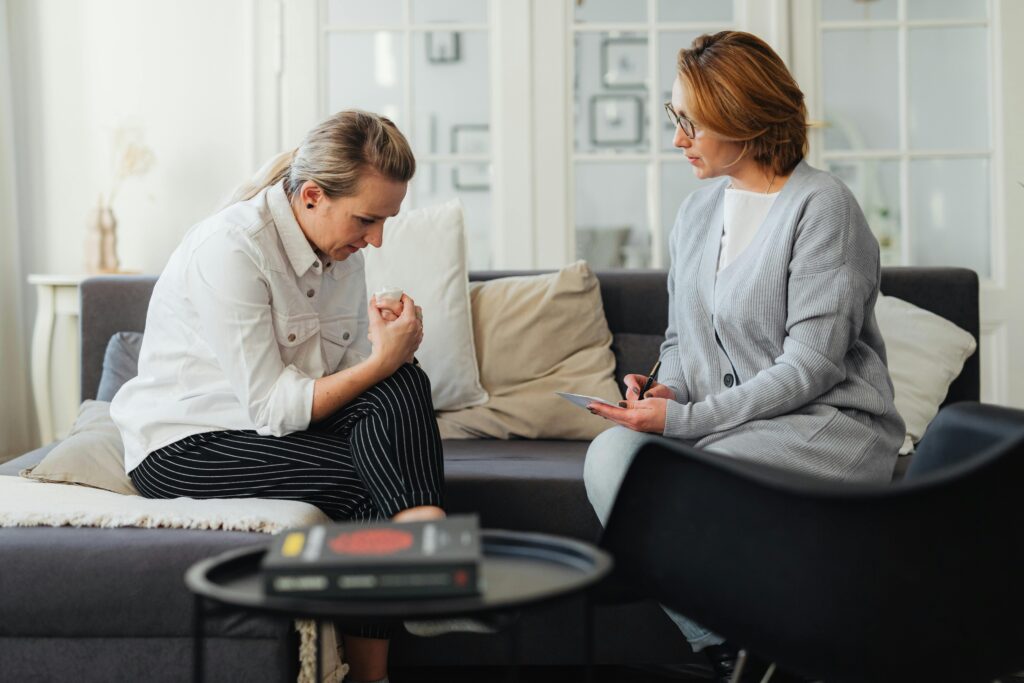Finding the right mental health or addiction treatment can feel overwhelming, especially when deciding between an Intensive Outpatient Program (IOP) and a Standard Outpatient Program. Both offer outpatient care but differ significantly in terms of intensity, structure and what type of patient they serve.
At Novu Wellness in Sugar Hill, GA, we’re committed to providing customized care that meets your specific needs. In this article, we’ll break down the key differences between IOP and standard outpatient programs, helping you decide which is right for you or your loved one.

Understanding Intensive Outpatient Programs (IOP)
Intensive Outpatient Programs (IOPs) are a popular treatment option for individuals struggling with mental health or substance use disorders. These programs are designed for people who need structured, frequent therapy but do not require 24-hour supervision. IOP allows patients to live at home and maintain daily responsibilities like work or school while receiving comprehensive mental health care or addiction treatment.
Key Features of IOP:
- Frequent therapy sessions: Patients typically attend therapy 3-5 times a week for several hours per day.
- Structured environment: Despite not being residential, IOP programs are highly structured, including group therapy, individual counseling, and often family therapy.
- Support without hospitalization: IOP offers an intermediate level of care—more intensive than standard outpatient treatment but less than full hospitalization.
- Focus on skill-building: Therapy sessions focus on coping skills, emotional regulation, relapse prevention, and interpersonal relationships.
At Novu Wellness in Sugar Hill, GA, we provide IOP services tailored to meet the needs of individuals with moderate to severe mental health or addiction challenges. Whether you’re transitioning from inpatient care or seeking intensive therapy while continuing daily life, IOP is a flexible yet powerful option to consider.
What Is a Standard Outpatient Program?
Standard Outpatient Programs (OP) provide mental health and addiction treatment for those who don’t require intensive supervision. Outpatient programs are a great option for individuals with mild to moderate conditions who can maintain their regular routines and responsibilities while attending therapy once or twice a week.
Key Features of Standard Outpatient Programs:
- Less frequent therapy: Typically, sessions are once or twice a week, depending on the needs of the patient.
- Ongoing support: While less intensive, outpatient therapy can continue for months or even years, providing long-term support.
- Flexibility: Patients can maintain their daily routines, including work, school, and family obligations, while receiving necessary treatment.
- Variety of therapy options: Outpatient programs offer a range of therapies such as cognitive-behavioral therapy (CBT), dialectical behavior therapy (DBT), and medication management.
At Novu Wellness, our standard outpatient programs in Sugar Hill, GA, are ideal for those who need ongoing support but do not require the intensity of an IOP. This option is perfect for individuals seeking to manage their mental health or substance use while continuing with everyday life.
Key Differences Between IOP and Outpatient Programs in Sugar Hill
While both IOP and standard outpatient programs offer flexible, non-residential treatment, they differ significantly in intensity, duration, and the types of patients they serve. Let’s break down the major differences:
1. Intensity of Treatment
- IOP: Patients in an IOP receive treatment multiple times a week, making it a more intensive approach. Therapy may take up to 3-4 hours a day, several days a week, allowing for deeper therapeutic engagement.
- Standard Outpatient Program: Patients attend therapy less frequently—typically once or twice a week, with sessions lasting around an hour. Outpatient programs provide long-term support but with less structure.
2. Structure and Supervision
- IOP: IOP offers more structured care, with regularly scheduled sessions involving multiple types of therapy (group, individual, family). It also includes frequent assessments to monitor progress.
- Standard Outpatient Program: Outpatient therapy is less structured, with patients attending therapy based on their personal schedule and needs. The flexibility is higher, but the oversight is less frequent.
3. Types of Patients
- IOP: Best suited for individuals with moderate to severe conditions, including those recovering from substance abuse, anxiety, depression, or trauma. IOP is also ideal for those transitioning from inpatient or residential care who need ongoing support.
- Standard Outpatient Program: This option is typically best for individuals with mild symptoms or those who have completed more intensive programs and need continued but less frequent care.
4. Duration of Treatment
- IOP: The program usually lasts between 8 to 12 weeks, with frequent check-ins and therapy sessions designed to stabilize patients quickly.
- Standard Outpatient Program: Outpatient care can last much longer—months or even years—depending on the patient’s needs. It provides a sustainable long-term treatment plan with less intensive requirements.
5. Cost and Insurance
- IOP: Since IOP requires more frequent sessions, it tends to be more expensive than standard outpatient programs. However, many insurance plans cover IOP, recognizing it as a critical form of care for those with moderate to severe mental health issues.
- Standard Outpatient Program: Generally more affordable than IOP due to the reduced number of sessions. Many patients can also access sliding-scale payment options for outpatient care.
At Novu Wellness, we help residents in Sugar Hill navigate their insurance options and payment plans to find the best solution for their mental health care.

Who Should Consider IOP?
Intensive Outpatient Programs (IOP) are best suited for individuals who need a higher level of care but do not require the 24/7 supervision of a residential program. This option works for people struggling with mental health conditions or addiction but who are stable enough to live at home while receiving treatment.
Ideal Candidates for IOP:
- Moderate to severe mental health issues: Those dealing with more significant symptoms of depression, anxiety, PTSD, or addiction.
- Substance use disorders: IOP is especially beneficial for individuals struggling with addiction who need intensive care but not hospitalization.
- Transitioning from inpatient care: Many individuals step down from an inpatient program to IOP to continue receiving structured treatment while reintegrating into daily life.
- Need for flexibility: People who want to maintain their family, work, or educational commitments while undergoing therapy.
At Novu Wellness, we tailor our IOP programs to fit the specific needs of our patients in Sugar Hill, GA, ensuring they receive intensive care without disrupting their daily lives.
Who Should Consider Standard Outpatient Programs?
Standard Outpatient Programs are ideal for individuals with mild to moderate mental health or substance use disorders. These programs are flexible, allowing patients to attend therapy sessions around their work, school, or family schedules.
Ideal Candidates for Standard Outpatient Care:
- Mild mental health symptoms: Those dealing with milder forms of depression, anxiety, or stress.
- Completed higher levels of care: Individuals who have finished an inpatient or IOP program and are ready for less frequent treatment.
- Need for long-term support: People who want ongoing therapy for maintenance or relapse prevention.
- Busy schedules: Individuals who need flexibility to attend to work, school, or family responsibilities while seeking treatment.
Novu Wellness offers outpatient programs in Sugar Hill, GA, that provide long-term mental health care in a flexible format, ensuring patients can prioritize their well-being without sacrificing other aspects of their life.
How to Choose Between IOP and Standard Outpatient Programs
Choosing between an IOP and a standard outpatient program can be difficult, but it ultimately depends on the severity of your symptoms, your support system, and your daily responsibilities. Here’s a breakdown to help guide your decision:
Factors to Consider:
- Severity of symptoms: If you have moderate to severe mental health or addiction issues, IOP is likely the better option. If your symptoms are mild or you’re in recovery, outpatient care may suffice.
- Need for support: If you don’t have a strong support system at home, the structured environment of an IOP may provide the necessary guidance and accountability.
- Daily responsibilities: If you have significant responsibilities like work, school, or family, outpatient programs offer the flexibility to continue therapy without significant disruptions.
- Stage of treatment: IOP may be ideal for those early in their recovery, while outpatient care works best for individuals who are further along in their treatment journey.
At Novu Wellness, we offer personalized consultations to help individuals in Sugar Hill determine which program is the best fit for their mental health or addiction treatment needs.
Benefits of IOP vs. Standard Outpatient Programs
Both IOP and standard outpatient programs provide outpatient mental health and addiction care, but each offers unique benefits depending on the patient’s needs.
Benefits of IOP:
- More intensive therapy: With multiple therapy sessions each week, IOP allows for deeper engagement and faster progress.
- Structured environment: The structured schedule of IOP provides a sense of routine and accountability.
- Comprehensive care: IOP often includes various forms of therapy (individual, group, and family) along with medication management, offering a well-rounded approach to treatment.
Benefits of Standard Outpatient Programs:
- Flexibility: Outpatient care allows patients to maintain their work, school, or family commitments while receiving treatment.
- Long-term support: Patients can stay in outpatient therapy for as long as they need, making it a great option for ongoing mental health care.
- Cost-effective: Outpatient programs are generally less expensive than more intensive treatment options like IOP or inpatient care.
At Novu Wellness, we pride ourselves on offering flexible, patient-centered treatment options to meet the diverse needs of our community in Sugar Hill, GA.
Local Resources for Mental Health Treatment in Sugar Hill, GA
For residents of Sugar Hill, GA, seeking mental health or addiction treatment, Novu Wellness offers both IOP and standard outpatient programs. Our experienced therapists and counselors provide customized care to meet each individual’s needs, whether you’re looking for intensive therapy or long-term outpatient support.
Additional Resources:
- Mental health support services: Novu Wellness offers a variety of therapy options, including cognitive-behavioral therapy, dialectical behavior therapy, and family therapy.
- Substance abuse treatment: For individuals struggling with addiction, our IOP and outpatient programs offer structured, evidence-based treatment designed to help you achieve long-term recovery.

IOP vs. Standard Outpatient: Frequently Asked Questions (FAQs)
What are the main differences between IOP and standard outpatient treatment?
IOP is more intensive, with frequent therapy sessions throughout the week, while standard outpatient treatment is less frequent and more flexible.
How many hours a week is an IOP program?
An IOP program typically involves 9-12 hours of therapy per week, spread across multiple days.
Is IOP more effective than standard outpatient treatment?
IOP can be more effective for individuals with moderate to severe mental health or substance use disorders due to its structured and intensive nature.
How do I know if I need IOP or standard outpatient treatment?
Your decision should be based on the severity of your symptoms, your level of daily functioning, and the support you have at home. A consultation with Novu Wellness can help you decide.
Can I continue working or attending school while in an IOP?
Yes, many individuals in IOP maintain their work or school schedules, but IOP requires a greater time commitment than outpatient care.
Can I switch from IOP to standard outpatient care once I improve?
Yes, many individuals transition from IOP to outpatient care as they progress in their treatment.
Explore Our IOP Program near Sugar Hill, GA
Choosing between the many IOP and standard outpatient programs is a personal decision that depends on your specific needs and circumstances. At Novu Wellness in Sugar Hill, GA, we offer both options, ensuring that you or your loved one can receive the right level of care to achieve long-term recovery and mental well-being. Whether you need intensive support through an IOP or flexible ongoing care through outpatient therapy, our team is here to help guide you every step of the way. Contact us today to take the first steps in your journey.




